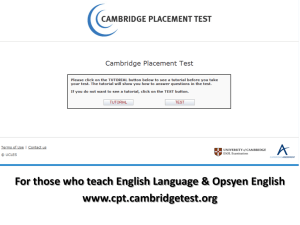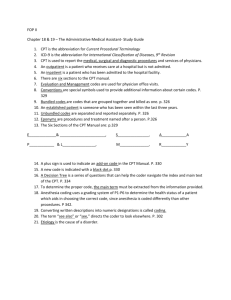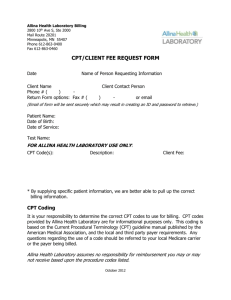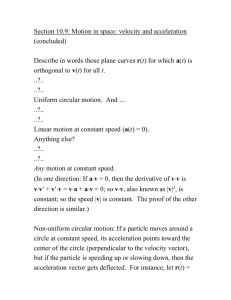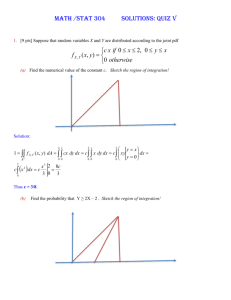RESEARCH PROTOCOL EACPT
advertisement
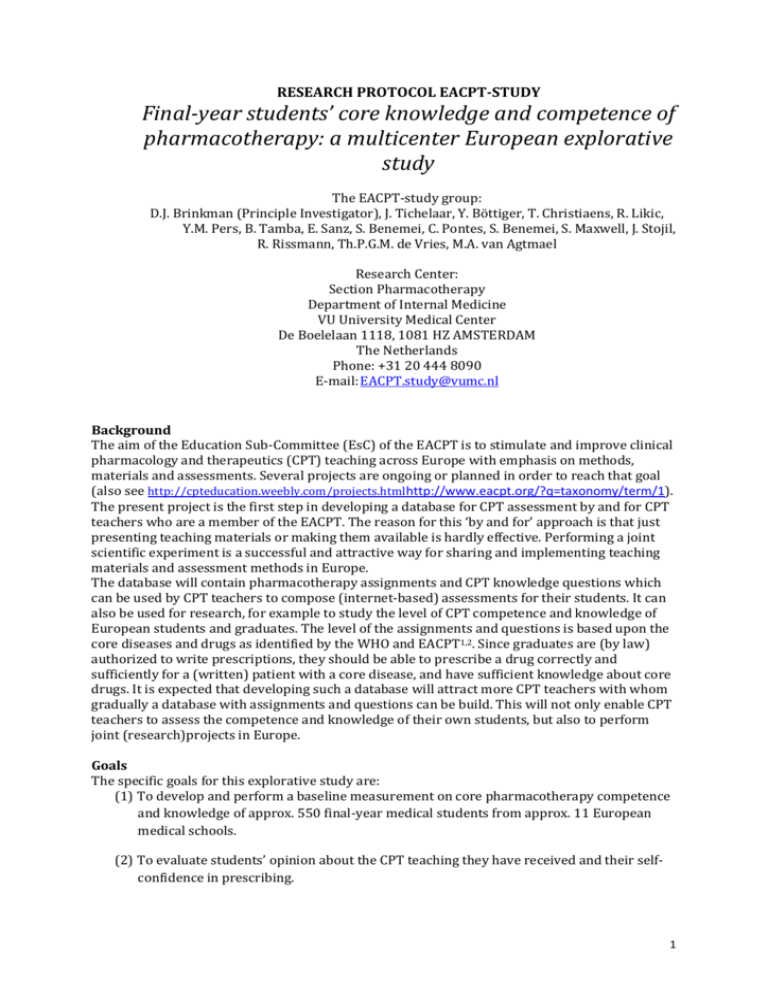
RESEARCH PROTOCOL EACPT-STUDY Final-year students’ core knowledge and competence of pharmacotherapy: a multicenter European explorative study The EACPT-study group: D.J. Brinkman (Principle Investigator), J. Tichelaar, Y. Böttiger, T. Christiaens, R. Likic, Y.M. Pers, B. Tamba, E. Sanz, S. Benemei, C. Pontes, S. Benemei, S. Maxwell, J. Stojil, R. Rissmann, Th.P.G.M. de Vries, M.A. van Agtmael Research Center: Section Pharmacotherapy Department of Internal Medicine VU University Medical Center De Boelelaan 1118, 1081 HZ AMSTERDAM The Netherlands Phone: +31 20 444 8090 E-mail: EACPT.study@vumc.nl Background The aim of the Education Sub-Committee (EsC) of the EACPT is to stimulate and improve clinical pharmacology and therapeutics (CPT) teaching across Europe with emphasis on methods, materials and assessments. Several projects are ongoing or planned in order to reach that goal (also see http://cpteducation.weebly.com/projects.htmlhttp://www.eacpt.org/?q=taxonomy/term/1). The present project is the first step in developing a database for CPT assessment by and for CPT teachers who are a member of the EACPT. The reason for this ‘by and for’ approach is that just presenting teaching materials or making them available is hardly effective. Performing a joint scientific experiment is a successful and attractive way for sharing and implementing teaching materials and assessment methods in Europe. The database will contain pharmacotherapy assignments and CPT knowledge questions which can be used by CPT teachers to compose (internet-based) assessments for their students. It can also be used for research, for example to study the level of CPT competence and knowledge of European students and graduates. The level of the assignments and questions is based upon the core diseases and drugs as identified by the WHO and EACPT1,2. Since graduates are (by law) authorized to write prescriptions, they should be able to prescribe a drug correctly and sufficiently for a (written) patient with a core disease, and have sufficient knowledge about core drugs. It is expected that developing such a database will attract more CPT teachers with whom gradually a database with assignments and questions can be build. This will not only enable CPT teachers to assess the competence and knowledge of their own students, but also to perform joint (research)projects in Europe. Goals The specific goals for this explorative study are: (1) To develop and perform a baseline measurement on core pharmacotherapy competence and knowledge of approx. 550 final-year medical students from approx. 11 European medical schools. (2) To evaluate students’ opinion about the CPT teaching they have received and their selfconfidence in prescribing. 1 Methods Study Design This study is designed as a cross-sectional measurement of final-year medical students at 11 European medical schools. A specially developed online instrument is used to measure students’ core pharmacotherapy knowledge and competence. In addition, we ask students to fill in an online questionnaire to evaluate their opinion about the CPT teaching they have received and their self-confidence in prescribing. The following schools are invited due to individual staff connections with the EACPT EsC: Potential participating medical schools 1. VU University Medical Center, The Netherlands 2. Leiden University Medical Center, The Netherlands 3. Ghent University Hospital, Belgium 4. University of Toulouse, France 5. University of Montpellier 6. Linköping University, Sweden 7. University Hospital Olomouc, Czech Republic 8. Alexandru Ioan Cuza University, Rumania 9. University Clinical Hospital Center Zagreb, Croatia 10. University of Edinburgh, Scotland 11. Universitat Autonama de Barcelona, Spain 12. University of Florence, Italy 13. University of Tenerife, Spain Local coordinators J. Tichelaar R. Rissmann T. Christiaens B. Chamontin Y.M. Pers Y. Böttiger J. Strojil B. Tamba R. Likic S. Maxwell C. Pontes S. Benemei E. Sanz Selection of Participants A local study coordinator is assigned at each participating medical school. The coordinator selects 50 final-year students that are actively studying during the academic year 2014-2015 to participate in the study. Students are asked to volunteer to complete a ½-hour measurement on their pharmacotherapy knowledge and competence. This measurement is done at a scheduled time frame (e.g. before a lecture) in March or April 2015, using an entirely online system (surveymonkey.com). This system can be accessed from any internet-enabled computer in the world. The students are not allowed to use any references or consult each other during the measurement. Participation is anonymous and without compensation; confidentiality is guaranteed. Materials (1) Online measurement - Core competence: To measure the competence, each student has to choose a treatment for 4 written patient cases. Each case consists of a brief description of a patient with an essential disease2. The diseases in this study are gastroesophageal reflux disease, osteoarthritis, bronchitis and essential hypertension. If the student decides to prescribe a drug treatment, he/she has to fill in the drug name, drug dose, drug dosage and method of administration (max. 2 drugs per case). The student may also choose a non-drug treatment and thus not to write any drug prescription. To assess students’ competence, a scoring form based on the European guidelines will be developed in collaboration with the local coordinators. The 4 patient cases are of increasing difficulty (see Annex 1 for an example case): -Case A: a simple case of a middle-aged adult with gastroesophageal reflux disease; - Case B: a case of a patient with osteoarthritis not responding to first-choice drug treatment; 2 - Case C: a case of a patient with initially uncomplicated acute bronchitis who develops pneumonia; - Case D: an extensive case of a patient with essential hypertension not responding to first-choice drug treatment and with potential drug interactions. - Core knowledge: To measure the knowledge, each student has to answer 24 multiple choice questions about the essential diseases and their core drugs (see Annex 2 for example questions). The content of the questions consists of essential pharmacotherapy knowledge that students are expected to possess before graduation. For each case, 6 questions have to be answered. Questions are subdivided into three categories: mechanism of action, side effects and drug interactions/contraindications. Instrument validity To construct the validity of the instruments, the following steps will be conducted: (1) to establish its content validity, the content of the instruments is based on available literature1-4; (2) the content of the materials will be send to each local coordinator for feedback; (3) the measurement will be tested in a pilot study at 2 medical schools. (2) Online questionnaire After the measurement, all participating students fill in an online questionnaire regarding: (1) participants’ characteristics; (2) self-confidence in prescribing; (3) their opinion about the CPT teaching they have received at their medical school. Data collection The study data will be collected from March 2015 to April 2015. Data is collected by the principle investigator using surveymonkey.com. Statistical analysis Analyses are performed with SPSS version 20.0. Besides descriptive analysis of student characteristics, the prescribed drugs and answers of the knowledge questions, we also do some comparative analyses, e.g. the relation between high/low scores on CPT knowledge questions and high/low scores of competence scores, and the differences between medical schools. The name and country of the participating universities will not be shown in the final results. Ethical considerations This study protocol will be submitted to the Dutch Ethical Review Board of Medical Education for review. A written informed consent will be obtained from each participant prior to inclusion. Financing A fee of 350 euros will be provided to each coordinator to cover any expenses. Planning 19 January – 30 January 2 February – 13 February 16 February – 20 February 23 February – 6 March 9 March – 1 May 2 May – 26 June 2015 27 – 30 June 2015 Augustus 2015 – December 2015 Recruiting universities, selecting local coordinators Local coordinators provide feedback on materials Modifying materials Pilot study, coordinators recruit students for study Data collection: measurement among students Data analysis Presenting results at EACPT Congress in Madrid Writing and submitting manuscript 3 References [1] WHO Model list of Essential Medicines. 18th edition. 2013. World Health Organisation: Geneva, Switzerland. [2] Orme M, Frolich J, Vrhovac B. 2002. Towards a core curriculum in clinical pharmacology for undergraduate medical students in Europe. BJCP 58:635-640. [3] Ross S, Maxwell S. 2012. Pharmacotherapy and the core curriculum for tomorrow’s doctors: BPS curriculum in clinical pharmacology and pharmacotherapy for medical students. BJCP 74:644-661. [4] Nierenberg DW. 1991 A core curriculum for medical students in clinical pharmacology. J ClinPharmacol 31:307311. 4
